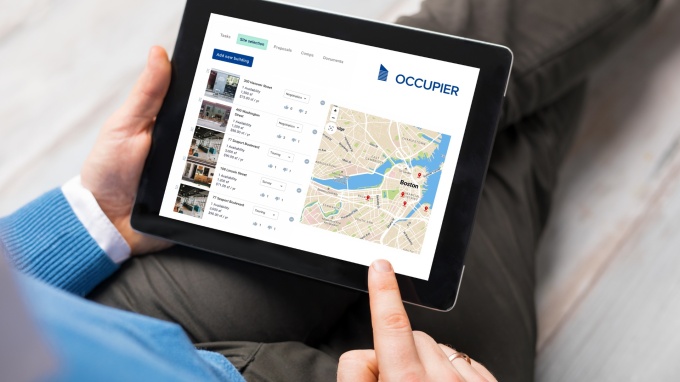The COVID-19 pandemic has created all sorts of real estate issues for companies as it forced so many employees to work from home, leaving empty space all over the globe.
And while there is no shortage of technology out there for landlords, there are fewer options for commercial real estate tenants and brokers.
Enter Occupier. The New York-based startup has developed lease management software for commercial real estate tenants and brokers. This is particularly timely, considering how many businesses are having to make tough decisions about how to use their space as the pandemic rages on. The company’s original focus was on offices as an asset class but has expanded over time to include any business that has a real estate strategy –– from healthcare clinics to retailers to warehouses.
And today, Occupier is announcing it has raised $10.5 million in a Series A funding round.
OMERS Ventures and Stage 2 Capital co-led the investment, which included participation from existing backers Alate Partners and Metaprop. The raise brings the total raised by Occupier since its 2018 inception to $15.5 million.
Founded in 2018 by commercial real estate industry and proptech veterans Matt Giffune, Andrew Flint and Erik Pearson, Occupier says it’s on a mission to help organizations “make smarter real estate decisions for their business.” Its software is designed to automate the lease administration process, lease accounting and transaction management.
It’s also aimed at helping organizations remain in compliance with new lease accounting guidelines that were effective for public companies in 2021 and will impact private companies this year.
The effects of the COVID-19 pandemic and coinciding recent changes to federal lease accounting standards combined have forced companies to have more ownership over their real estate, noted Occupier co-founder Matt Giffune.
“Tenants are in a phase of adaptation as they re-evaluate their real estate strategy, and thus their adoption of digital solutions,” he said. “Office occupiers started experimenting with hybrid work models, restaurateurs began adopting ghost kitchens and retailers continued exploring omni-channel models.”
As such, the pandemic affected Occupier’s business in ways the company could not have predicted, Giffune said. Suddenly, companies had empty space for which they had to find creative uses.
“More and more tenants began searching for commercial real estate tech solutions to help them solve the problem of unlocking the data in their lease portfolio and then evaluating that to make better real estate decisions for their business,” he added. “What Occupier does is allow brokers and heads of real estate to sign a lease agreement, then automate the management of critical dates and clauses, while the accounting team compliantly recognizes that lease then closes the books, all on one platform.”
While the company declined to reveal hard revenue figures, it did say that it saw over 200% year over year growth in annual recurring revenue (ARR). It has more than 130 customers across a variety of verticals, including Bluestone Lane Coffee, Afterpay, Shake Shake, Gorillas, DraftKings, [solidcore] and Bonobos.

Image Credits: Occupier
Legacy software companies typically focused on a single module, which can create silos of work and disparate sets of data, noted Giffune.
“Here at Occupier, we are building a single source of truth with a modern and intuitive interface, accessible by every stakeholder in a business that requires access to real estate data,” he said. “Our software is enabling tenants to collaborate on the entire lease life cycle.”
The company plans to use its new capital in part toward doubling its current 26-person headcount over the next year.
“Our near-team focus is to build the most user-friendly lease management and accounting platform for the masses,” Giffune said. “Long term, we will look to provide our customers with access to third-party data sources within Occupier that inform real estate decisions and drive more efficient workflows.”
Fun fact about the startup: Other than two of its co-founders, its board is female.
Michelle Killoran, a principal at OMERS Ventures, told TechCrunch that her firm has long recognized that the commercial real estate sector “was ripe for disruption.”
“The pandemic created a seismic shift in terms of the speed at which companies started looking for ways to optimize their real estate. And not just as it relates to flexible working — think about retail outlets, restaurants, health clinics,” she said. “Occupier just had the right business model, with the right team, at the right time in the market — they ticked all the boxes for us from the get-go.”
She believes that Occupier is different from other technology aimed at tenants and brokers because it connects all stakeholders.
“Lots of offerings out there are a threat to brokers — so why would they use it?”
In the long term, OMERS fully expects to see a decline in traditional, massive corporate headquarters and an uptick in smaller offices spread across larger geographic areas, with more frequent changes.
“For retail and warehouses, there continues to be a shifting landscape these businesses need to adapt to in near real time,” Killoran said. “For all of these reasons, it’s imperative that businesses, not just real estate professionals, have access to reliable, transparent data. And Occupier gives them just that.”
Stage 2 Capital’s Liz Christo believes Occupier has the potential to be the operating system for real estate teams.
“In addition to the operating platform angle for companies, Occupier has a CRM for brokers,” she told TechCrunch. “As more customers use Occupier, they invite their brokers in and those brokers in turn are exposed to the software and can enable usage by more of their clients — a true virtuous cycle.”

